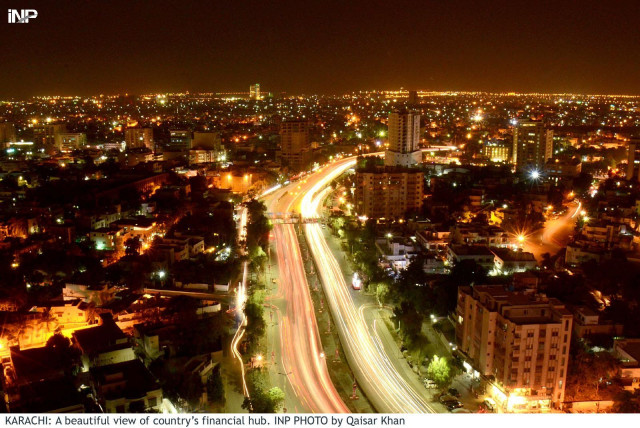What is wrong with Pakistan’s economy?
Most economists cannot unearth societal and cultural foundations that constrain growth and prosperity in the long run

PHOTO: INP
Some may highlight rampant corruption and microeconomic foundations of key economic and social sectors. Often, the economic dialogue is narrowly confined to these indicators and sectoral reports.
Pakistan predicted to be world’s fastest-growing Muslim economy in 2017
Most of the economists cannot unearth the societal and cultural foundations that may be constraining economic growth and prosperity in the long run. This is perhaps one of the reasons it is remarked that “the economy is too important to be left to economists.”
Since independence, Pakistan’s economy sporadically achieved GDP growth higher than 5% — especially during military governments in 1960s, 1980s and 2000s. However, it would be too simplistic and flawed to establish a correlation between military rule and higher economic growth; the phenomenon is indeed “borrowed growth”.
Pakistan achieved higher economic growth due to support by international players. We have rarely made efforts to reform institutional architecture, strengthen state capacity, foster a culture of knowledge creation and diffusion and harness human resource potential. Vibrant societies give space and value to ideas and new knowledge.
However, in Pakistan, the chief executive of every public or private sector organisation considers themselves final authority in a range of issues. Hence, there is generally no appreciation of diversity of opinions and ideas. Cultural attributes such as openness to new ideas and honouring transaction-commitments feed into overall economic performance. Both traits are marginalised in the country.
It is important to appreciate that these policy and cultural attributes cannot be transplanted in a vacuum. Sometimes, visionary political leaders can influence societal and cultural changes to advance economic and social transformation agendas.
It may appear true in the cases of Lee Kuan Yew (Singapore), Paul Kagame (Rwanda), Seretse Khama (Botswana), Mao Zedong, Deng Xiaopeng (China) and Lula da Silva (Brazil). Pakistan has been waiting for such miraculous leadership. But little attention is paid to the fact that, more often than not, the transformation is organic in nature and requires a society-wide response.
The most recent book by economic historian Joel Mokyre, ‘A Culture of Growth: The Origins of the Modern Economy’, is an excellent account of such societal changes which shaped industrial revolution in western nations from 1500-1700 AD.
He has explained eloquently why the sustained economic growth based on scientific and technological advances only occurred in Europe: “What changed in this age was the culture—the beliefs and attitudes of educated elite towards, useful knowledge, how to acquire it, how to distribute it, and what it could do”.
The respect and influence that cultural entrepreneurs like Francis Bacon and Newton gained was perhaps unmatchable in any other society at that time. The elite took pride in intellectual ventures and literary dialogues.
The transnational and virtual community of intellectuals—The Republic of Letters—fostered competitive market for ideas in philosophy, physics, medicine, mathematics, and other fields. Many of the ordinary technicians and workers turned themselves into inventors of technology by exploiting the existing knowledge and favourable patent structure. And of course, the society was open to new ideas and knowledge coming from Islamic, Indian, and Chinese civilisations.
Mokyre described the role of politics in this process: “Princes and kings competed to provide patronage and protection to the most successful and best known artists and scientists.”
If we try to find such things in today’s Pakistan, we will certainly be disappointed. How can we achieve economic advancement in this environment?
Certainly, an increase in so-called GDP numbers will occur occasionally but it would be hard to create and sustain any economic transformation. Bureaucratic structures are prevalent in universities, scientific organisations, research centres and business organisations.
Most business corporations have raised empires through an insidious nexus with the state. Hence, the prevalence of “Seth Culture” and intergenerational businesses don’t promote creativity, innovation and competitiveness by employing a talented work force and giving space to new business ideas.
Where is the economy stuck?
We need to pose a right set of questions to know what’s wrong with Pakistan’s economy. Some of these questions are: Why Pakistan could not develop educational institutions like Delhi School of Economics and Indian Institute of Technology?
Why our business organisations could not become TATA? Why Pakistan could not develop a city like Shenzhen? Malaysia and many other countries used to send their bureaucrats to Pakistan for training in 1960s but what happened to us afterwards? Why does the public sector no longer attract and retain talent? Instead of a rhetoric of security challenges and political instability, the answer to many of the above questions lies in the absence of market for talent, ideas, and knowledge.
The aforementioned weaknesses and constraints rarely attract the attention of policy makers and popular economic writers. Without addressing these fundamental issues, Pakistan will continue to rely on “borrowed growth” with the change of one lender after another.
While there is an urgent need to fix pressing security challenges, more deep rooted reforms are required to develop and attract talent to serve in the public sector and businesses. Instead of politicians, the community leaders, academics and intellectuals should have a greater role in societal transformation.
The writer is a public policy practitioner and researcher
Published in The Express Tribune, April 10th, 2017.
Like Business on Facebook, follow @TribuneBiz on Twitter to stay informed and join in the conversation.



















COMMENTS
Comments are moderated and generally will be posted if they are on-topic and not abusive.
For more information, please see our Comments FAQ